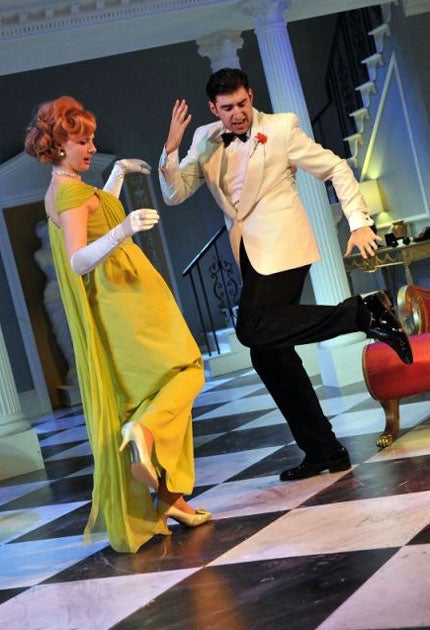The Game of Love and Chance, Playhouse, Salisbury
Old farce with a new identity

Your support helps us to tell the story
From reproductive rights to climate change to Big Tech, The Independent is on the ground when the story is developing. Whether it's investigating the financials of Elon Musk's pro-Trump PAC or producing our latest documentary, 'The A Word', which shines a light on the American women fighting for reproductive rights, we know how important it is to parse out the facts from the messaging.
At such a critical moment in US history, we need reporters on the ground. Your donation allows us to keep sending journalists to speak to both sides of the story.
The Independent is trusted by Americans across the entire political spectrum. And unlike many other quality news outlets, we choose not to lock Americans out of our reporting and analysis with paywalls. We believe quality journalism should be available to everyone, paid for by those who can afford it.
Your support makes all the difference."What the world needs now is love, sweet love..." sings a man at a white grand piano. Other characters are placed around a pastel blue vestibule with doors and an upper level. It's a country house in the Home Counties, but Philip Wilson's production also suggests the metropolitan glamour of Joseph Losey's The Servant or Antonioni's Blow-Up, with London swinging, or at least just about to.
The upper-middle-class girl with a beehive, Silvia, shouts angrily at her housemaid, Lisette, and to the others, that her feelings are her business and nobody else's. The doors slam shut. She's been assigned to a "suitable" fiancé, Dorant, by her father. With his blessing, she swaps roles with Lisette to test the chap's constancy.
Dorant has a similar idea, and dons his valet Arlecchino's grey chauffeur's suit to see if Silvia can love him for himself, not his money, while Arlecchino lays siege to Lisette like an Italian waiter in yellow socks, launching into funny walks or Elvis Presley's "It's Now or Never" at the drop of an accent.
The oddness and archness of all this is easily explained: the play is Marivaux's 1730 Parisian comedy, written for a bunch of Italian actors in exile, and this translation by Neil Bartlett flattens out the country/city contrasts – traduces Marivaux, in fact – in the cause of a society comedy in the mixed styles of Coward, Lonsdale and The Pink Panther.
Moving into the 1960s is no real desecration as Bartlett's text is a dance around Marivaux, a response to his subtle, sinuous writing, while preserving the laboratory nature of the social experiment: Silvia's father and brother hover above like love inspectors, though Wilson embroils them in the strictly organised running around and slamming of doors that punctuates the action.
The Playhouse is a hot destination these days, because of the intelligence of its classical work and the brio of the performances: "Funny how eloquent cheap emotion can be," someone remarks, ironically highlighting how real the play's affections are: there's never any question about the justness of the pairings, which is only half true in the original play.
Wilson's cast have a field day playing it, though, and conform to Marivaux's precept that they must, at all times, "feel" the value of what they are saying. Hattie Ladbury and Jo Herbert are nothing short of tremendous as Silvia and Lisette, the first playing the flutters and sweeps of a disguised almost-aristocrat with iron-clad technique and delicious flair, while Herbert's richly vocalised social upstart, donning posh frocks like a shopaholic on a spree, romps through the play with unswerving, and infectious, roguish delight.
There's some outrageous clowning, too, from Antonio Magro as Arlecchino, the commedia dell'arte stock character here resorting to type rather than defying it, but Magro is very funny, and definitely a new actor to watch. Tom Davey plays Dorant with exactly the right kind of good looks and gravitas, even eschewing a cheap laugh on his marriage proposal: "I offer you my hand and, believe me, my heart's in it."
To 23 April (01722 320 333)
Join our commenting forum
Join thought-provoking conversations, follow other Independent readers and see their replies
Comments